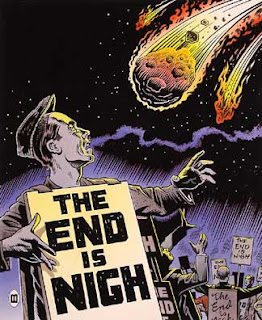The End Is Nigh!

By WizenedSage (Galen Rose) ~ I submitted the following for the Letters-to-the-Editor page of a local weekly newspaper. It was not printed. Why? Well, I don’t know really, but my best guess is that I provided way too much evidence that Jesus didn’t know what the hell he was talking about, or . . . maybe the editor didn’t care for my calling religious superstition a menace. Most of my submissions do get published, but now and then, I guess I push just a little too hard. Anyway, I thought some of you might find it moderately entertaining. The End Is Nigh! D id you know that the end is nigh? No, really! This time it’s for sure, according to preacher Harold Camping , President of Family Radio . Camping says Jesus will return on May 21, 2011 and the world will end five months later on October 21. Billboards paid for by supporters of Family Radio are promoting the prediction in major cities like Nashville, Louisville, St. Louis and Detroit. Of course, Camping is not the first to pr...














